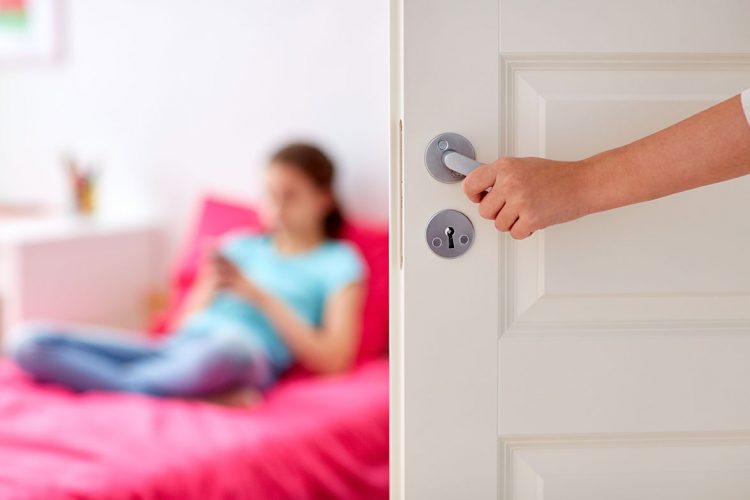What is The Deal With Privacy for Kids?

When I was a kid, I had a diary that I would write all sorts of things in, from deepest thoughts to my latest crush. I would tuck it under my pillow each morning for safe keeping. My parents knew not to mess with the diary. And that right there was where the conversation of my right to privacy began and ended.
When I was striking up new friendships, my parents would know about it because I would have to actually call people from the phone in our kitchen. Hanging out meant being in the same space as my friends, so my parents generally knew what I was up to. In this way, my parents were informed up close about my life, making it easy for them to step in seamlessly when appropriate for limit setting and tempering.
The Evolution of Respecting Privacy for Kids
The conversation today about privacy for our growing kids is stratospherically different. Rather than Dear Diary, today’s kids have unprecedented access to information, people, and experiences. They game with kids from other continents, have online friends they’ve never actually met in person, chat in apps and via text more than in real life. All of this means that parents hear about it downstream rather than in actual time, if at all.
Now consider that the human brain does not reach full maturity until the mid to late twenties. Your pre-teen and adolescent aged children are still immature by design. And further, during this period the brain’s reward circuitry is firing like mad, peer orientation is super amped up, and grey zones are very small which makes life more extreme. The bottom line? Your growing kids really need the tempering influence of your presence in their lives.
Which brings us back to the issue of privacy. I wonder if the fervour around privacy for kids these days has gone a little too far. Perhaps we have lost sight of the importance of development in this conversation, including the need for children to feel safe within the sphere of nurturing guidance that in-charge parents are meant to provide. By falling into the view that children deserve ultimate privacy, we fall away from the idea that our children deserve – and indeed, need – the mental rest that comes with knowing their adults are standing by.
So what does this mean in terms of privacy for kids? I think it means we evaluate privacy within the context of development, tethered to your child’s age and stage of development. It also means that you have a responsibility as a parent to stay on top of your child’s need for guidance and involvement in this modern world. And something like location sharing using Life360 is an ideal opportunity to make technology work for you and your child.
My two boys are 15 and 12 years old. When I discussed with them that Life360 would be part of how we did things as a family, both seemed keen to have this tool available as a means of staying connected. Neither one of them wondered about privacy. It wasn’t an issue for me and so, it wasn’t an issue for them.
It seems this is largely the norm for most kids in fact. A nationwide study conducted in 2018 by Life360 discovered that nearly 70% of teens are comfortable using a location sharing app with their family. This number jumped to 86% when there are added safety benefits such as those found in the Life360 Driver Protect Plan. Kids actually want you to be part of their lives in this way, and this is why location sharing now seems just a normal sort of thing that families do.
Staying Connected While Respecting Your Kid’s Privacy
As a Life360 location sharing family, there are a few things I have noticed. The first is that it has allowed my boys to feel a sense of connection during the times that we aren’t physically in the same place. For example, if I am at work and get a notification that my eldest has just arrived home from school, he loves it when moments later a text arrives telling him his options for an afterschool snack. Or when my youngest son is waiting to be picked up, he can see that I am 5 minutes away. And recently when my kids traveled to Thailand with their dad, I was able to see where they were and share in the excitement of the sights they were taking in. The average user of Life360 engages with the app 14 times per day. Which suggests that my family is no exception to liking the feeling of being more connected this way.
Second, I have noticed that using Life360 location sharing allows my boys to know that I really am in the lead of them. They see that I have my finger on the pulse of their day. I often talk about the importance of “being big” for your kids so that they intuitively orient towards you. I see all the time in my clinical work the veritable sigh of relief kids take when their parents are appropriately in the lead. Even if your kids don’t always love your directives, trust me when I say they love your leadership. They need it.
Third, as a mom I have found that Life360 is allowing me to have additional information in gauging my children’s development, and their propensity for handling increasing levels of independence. When I can see that they are showing up where and when they are supposed to be and adhering to the rules and guidelines set out, I know that they’ve got this. And with that, the radius of life for them can be increased.
Understand there may be times eventually when your child doesn’t want their location sharing on. With your older teens it will become appropriate for them to opt out of sharing their location at times as their independence increases. And appropriate for you as the parent to guide some protocol around this. A friend of mine recently shared that their family protocol is you text mom and dad first, saying a) you’re turning it off, and b) when it will be turned back on.
As with all things in the raising up of human beings, the foundation will always be relationship. To that end, there is simply no place for sneaking around when it comes to being capably in the lead as a parent. So discuss openly the use a location sharing feature, the data you are gleaning from it, and how it is informing your parenting decisions. This deepens relationship rather than threatens it, and that is ultimately important if you want to be truly in charge.

Dr. Vanessa Lapointe joined Life360 in March 2019 as a Family Expert to help further the company’s mission of keeping families safe and connected. Dr. Lapointe is an Author, parenting expert, and registered psychologist.


